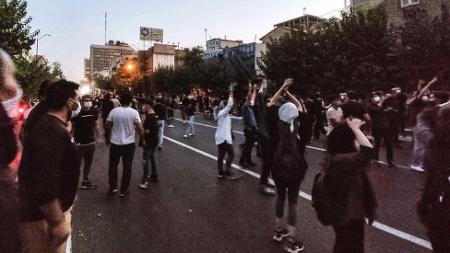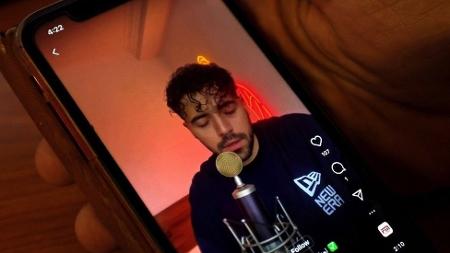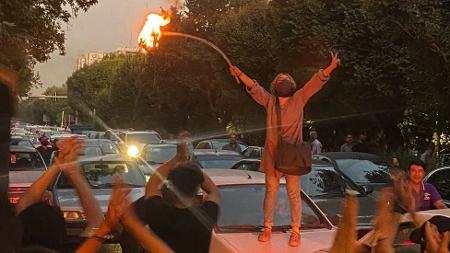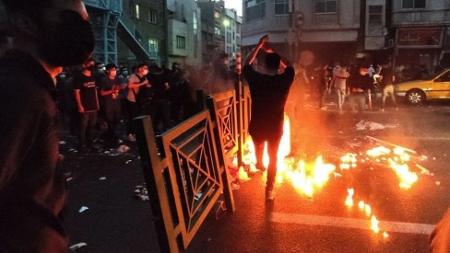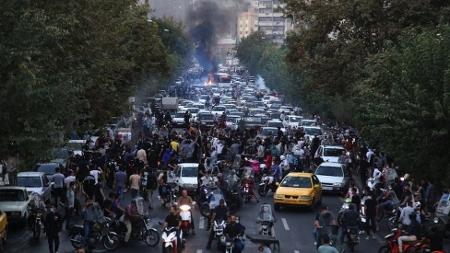The main slogan of the protests is ‘Women, Life, Freedom’ – a call for more equality in the Islamic Republic. But as the protests grew, the demands got wider.
Iran is experiencing a wave of protests across the country. They were triggered after the death of a young girl arrested by the so-called ‘morality police’.
Three weeks after the demonstrations, the protesters’ demands have grown to include a series of changes that young Iranians want for the country.
The trigger for the demonstrations was the death of Mahsa Amini, a young Iranian-Kurdish woman who died after she was detained by the country’s morality police for allegedly violating the law requiring women to cover their hair with headscarves or scarves.
Largely led by women, the protesters initially demanded answers as to how Amini died. They demanded punishment for the police, abolition of the veiling laws, and the abolition of the Iranian morality police.
‘Woman, Life, Freedom’
The main slogan of the protesters is “Women, Life, Freedom” – a call for equality and a strong affront to the fundamentalism that controls the country.
“This is a cry that we have never heard before in protests,” said BBC Persian correspondent Baran Abbasi.
Men joined the protests chanting the same slogan.
“Women’s rights were at the forefront when Amini died, but women’s rights and freedom in Iran mean freedom for everyone,” says British-based Iranian activist Negin Shiraghaei.
But as the protests spread and grew rapidly, the demands became broader.
Chants are heard in the streets calling for an end to the Islamic Republic and “death to the dictator” – a reference to the country’s supreme leader, ultra-conservative President Ebrahim Raisi.
“You hear it coming from school kids,” says Negin Shiraghaei. “They are taking to the streets… calling for the overthrow of the regime.”
There are also cries of “azadi, azadi, azadi” meaning “freedom, freedom, freedom”. These are given by university students.
In social media posts, people demand freedom of expression, freedom to wear what they want, and freedom to listen to whatever music they want – without fear of arrest.
To summarize the protesters’ demands, Negin Shiraghaei explains: “It’s basically about human rights. What they say on the streets is about freedom, women’s rights and overthrowing the government.”
viral protest music
A Twitter thread recently went viral sharing Iranians’ personal reasons for supporting the protests. Each tweet started with “For…”, for example: “For my dreams”, “For equality”, “For a normal life”.
A relatively unknown young Iranian singer named Shervin Hajipour was inspired by this and wrote a song about it. Lyrics is a compilation of tweets on the topic.
The song was shared by millions of Iranians and had more than 40 million views on Instagram within 48 hours of its release. “It’s unheard of for an unknown singer to get this many views on Instagram,” said Taraneh Stone, social media correspondent for BBC Persian.
Shervin Hajipour was arrested by the country authorities and the song was removed from his profile. He was later released.
angry generation
Many of the protesters on the streets are young, some still in high school.
“Classes have been interrupted at universities across the country, with students saying they won’t be returning to classes until their fellow prisoners are released,” says Negin Shiraghaei.
This is a time when the new generation of Iranians is particularly frustrated.
Systematic corruption among Iran’s political elite, rising poverty with over 50% inflation, and the lack of social and political freedoms left the youth hopeless.
For the first time since the 1979 Islamic Revolution – when the monarchy was overthrown and replaced by the Islamic Republic as we know it – the protests included people from different economic backgrounds.
They are located in middle-class and working-class areas, from the wealthy neighborhoods of the capital Tehran to the poorest parts of the country, such as Balochistan in the southeast, about 1,200km from Tehran.
And people of different ethnic backgrounds participate.
“The country’s mismanagement has been going on for the last forty years. Systematic corruption and sanctions [internacionais] It had effects at all levels of society,” says Negin Shiraghaei.
Diversity among protesters has widened the range of complaints, from rising prices and high unemployment to corruption and political repression.
previous protests
This is the longest protest movement in Iran since the 1979 revolution.
Previous demonstrations have been brutally suppressed by security forces due to rigged elections in 2009, economic mismanagement in 2017, and more recently fuel price increases in 2019.
The response of the authorities to the recent demonstrations was also predictable – dozens of people were killed and hundreds arrested. There have been repeated blackouts on the internet to prevent the population from posting videos and photos of the protests.
Yet they continue. Can protests change anything? “I definitely think so,” says Negin Shiraghaei. “This change is inevitable when women understand their rights and teach their children their rights,” says the activist.
– This text was published at https://www.bbc.com/portuguese/internacional-63179033.
source: Noticias
